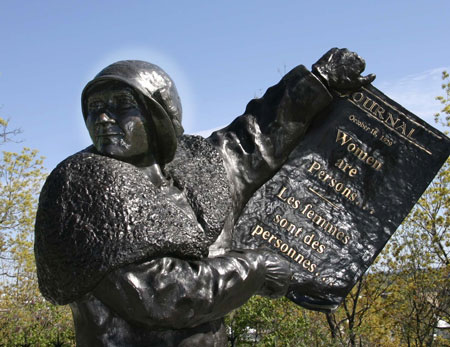This is an archive of news stories and research from the National Union of Public and General Employees. Please see our new site - https://nupge.ca - for the most current information.
'This year's theme is Celebrating Immigrant Women in Canada.'
Ottawa (5 Oct. 2007) – Since 1992, October has been recognized as Women’s History Month in Canada – a time to celebrate the incredible achievements of women. Canadian women have shaped and continue to shape our country – with their strength, wisdom and courage.
This year’s selected theme by the Status of Women Canada is Celebrating Immigrant Women in Canada. The National Union of Public and General Employees (NUPGE) is pleased that the government is acknowledging the important contribution that immigrant women make to Canada. NUPGE notes, however, the hypocrisy of the government’s withdrawal of funding from groups that provide a voice for immigrant women.

Parliament Hill, Ottawa
The Persons Case
The Federal Government of Canada declared the month of October as Canadian Women’s History Month in response to a letter-writing campaign led by a Victoria, B.C., woman named Lyn Gough. October was also chosen in recognition of the fact that on October 18, 1929, Canadian women were officially declared persons under the law.
The Persons Case is a legal history milestone in Canada. Five Albertan women, known as the Famous Five: Henrietta Muir Edwards, Nellie McClung, Louise McKinney, Emily Murphy and Irene Parlby, asked the Supreme Court of Canada to declare that women were persons under the law.
The Supreme Court denied the women who then appealed to the British Privy Council. The Privy Council described the exclusion of women as “a relic of days more barbarous than ours” and overturned the Canadian decision. On October 18, 1929, Canadian women became persons at last. October 18 has since been celebrated as Persons Day in Canada.
From the Famous Five's involvement in the Persons Case to today's female leaders, women continue to raise our social conscience, give voice to issues of inequality and work to build a future free of discrimination, violence and poverty.
2007 Theme
The theme for 2007 Women’s History Month is “Celebrating Immigrant Women in Canada”. The Status of Women Canada’s objectives for this year are to make Canadians aware of women immigrants to Canada and of the significance of citizenship to women in Canada. This theme reflects the fact that 2007 is the 60th anniversary of Canadian citizenship. In honour of this anniversary, Women’s History Month 2007 will celebrate the achievements of immigrant women in Canada and their contributions to building this country.
Immigrant Women in Canada have made significant contributions to the creation of what makes this country unique. They have done this despite the numerous obstacles they faced and continue to face in Canada. These obstacles include language barriers, no recognition of foreign credentials and lack of child care (especially for immigrant women employed in seasonal, irregular and shift work positions). The unemployment rate in 2006 for very recent immigrant women aged 15 to 24 was 19.9%, twice the rate of 9.8% among young Canadian-born women. In 1980, recent immigrant women were paid 23% less than Canadian-born women of similar ages and education. By 2000, this gap had doubled to 45%.
The National Organization of Immigrant and Visible Minority Women of Canada (NOIVMWC) has spoken out on Immigrant Women’s issues for more than two decades. The Organization was founded with government encouragement and core funding support. The core support has since been withdrawn but the Status of Women Canada (SWC) has played a critical role in supporting the creation of immigrant and visible minority women’s organizations provincially and locally.
However, NOIVMWC is yet another organization that has been directly affected by the Conservative government’s changing of the mandate, funding and office closures of the Status of Women Canada. In a brief to the Standing Committee on the Status of Women, NOIVMWC expressed concerns regarding the effects of these changes to both their organization and to women they represent. NUPGE
More information:
• Women's issues and the National Union
• Women's History Month Website
• National Organization of Immigrant and Visible Minority Women of Canada (NOIVMWC)
• NOIVMWC Brief to the Standing Committee on the Status of Women
